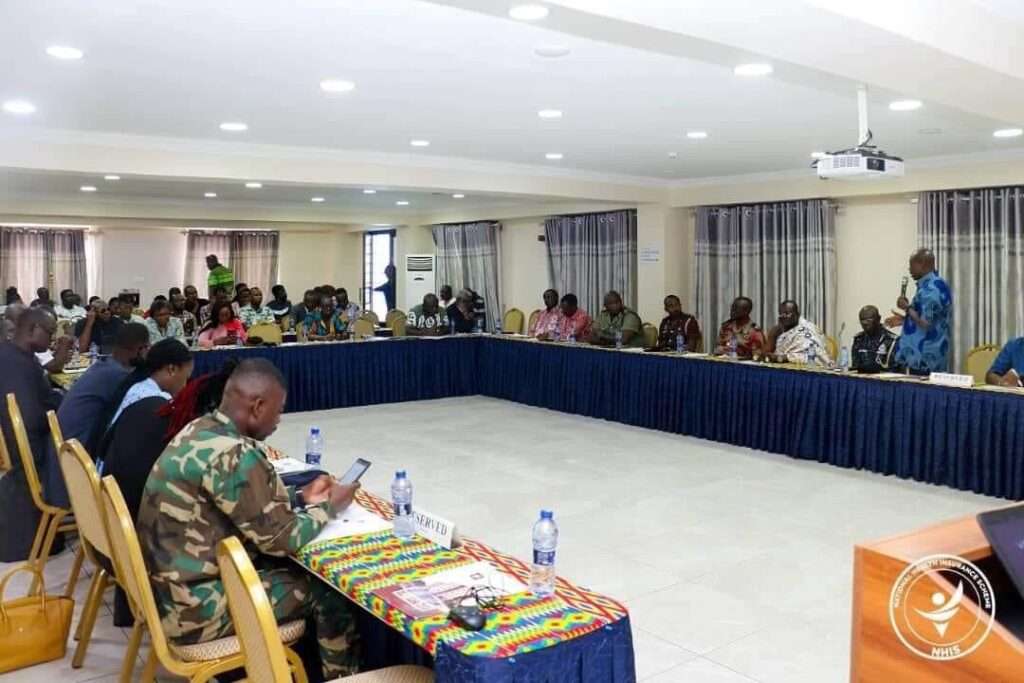The National Health Insurance Authority (NHIA) recently convened an important stakeholder meeting at the Eastern Premier Hotel in Koforidua, marking a significant step in its ongoing efforts to reform and enhance the National Health Insurance Scheme (NHIS).
The meeting, attended by the Board Chairman Dr. Ernest K. P. Kwarko and Chief Executive Dr. Da-Costa Aboagye, along with various directors and staff, was designed to gather support and advocacy for a series of proposed changes aimed at improving service delivery, expanding coverage, and ensuring the financial sustainability of the NHIS.
A cornerstone of the proposed reforms is the ambitious plan to extend health insurance coverage to more vulnerable and underserved populations. This initiative is in line with the global mandate to achieve Universal Health Coverage (UHC).
“Particularly the registration of children aged six to fourteen years for the Ghana card that could be used to access healthcare and mandatory health insurance for non-Ghanaian visitors to the country.”
Dr. Da-Costa Aboagye, Chief Executive NHIA
This move is expected to provide a crucial safety net for children who are often left out of health insurance schemes, ensuring they receive necessary medical care.
Moreover, the NHIA proposed mandatory health insurance for non-Ghanaian visitors to the country. This policy is intended not only to boost the NHIS funds but also to ensure that visitors have access to health services, safeguarding both their health and the public health system.
Another major reform involved the introduction of realistic service tariffs, accompanied by stringent control mechanisms. This approach aims to improve the financial sustainability of healthcare facilities, ensuring they can continue to provide quality services without financial strain.
By setting tariffs that reflect the actual cost of services, the NHIA hopes to curb the practice of illegal charges imposed on NHIS members at the point of service delivery. These illegal charges have long been a bane to the scheme’s effectiveness, and their eradication is crucial for restoring public trust and ensuring equitable access to healthcare.
The NHIA further recognized that achieving these reforms requires a collaborative approach. To this end, the authority is seeking to strengthen partnerships with a broad range of stakeholders, including healthcare providers, government agencies, the media, and non-governmental organizations. By fostering these alliances, the NHIA aims to create a more integrated and responsive health system capable of adapting to the needs of its users.
In an era where digital transformation is pivotal, the NHIA is not left behind. The authority plans to implement advanced digital solutions to streamline operations, reduce fraud, and improve access to services. These digital interventions are expected to make the NHIS more efficient, user-friendly, and transparent, ultimately enhancing the overall patient experience.
Stakeholder Feedback and Future Engagements

The meeting in Koforidua saw stakeholders from the southern belt of the country, including representatives from the healthcare sector, civil society organizations, security agencies, the private sector, and traditional rulers, actively participating and providing feedback on the proposed reforms. Their insights and concerns are invaluable for refining the reforms to better serve the public.
Dr. Da-Costa Aboagye emphasized the crucial role of stakeholder support and advocacy in the successful implementation of these reforms.
“Active involvement from all sectors of society is essential to achieve the desired outcomes. To this end, further engagements are planned in other parts of the country in the coming weeks, to launch some of the reforms in July.”
Dr. Da-Costa Aboagye, Chief Executive NHIA
The NHIA’s engagement with stakeholders in Koforidua represents a critical step towards revitalizing the NHIS. The proposed reforms, which focus on extending coverage, ensuring financial sustainability, strengthening partnerships, and leveraging digital solutions, have the potential to improve the scheme’s efficiency and effectiveness significantly.
However, the success of these reforms hinges on continued stakeholder support and collaboration. As the NHIA moves forward with its plans, it is imperative that all stakeholders remain engaged and committed to transforming the NHIS into a robust and equitable health insurance system that meets the needs of all Ghanaians.







